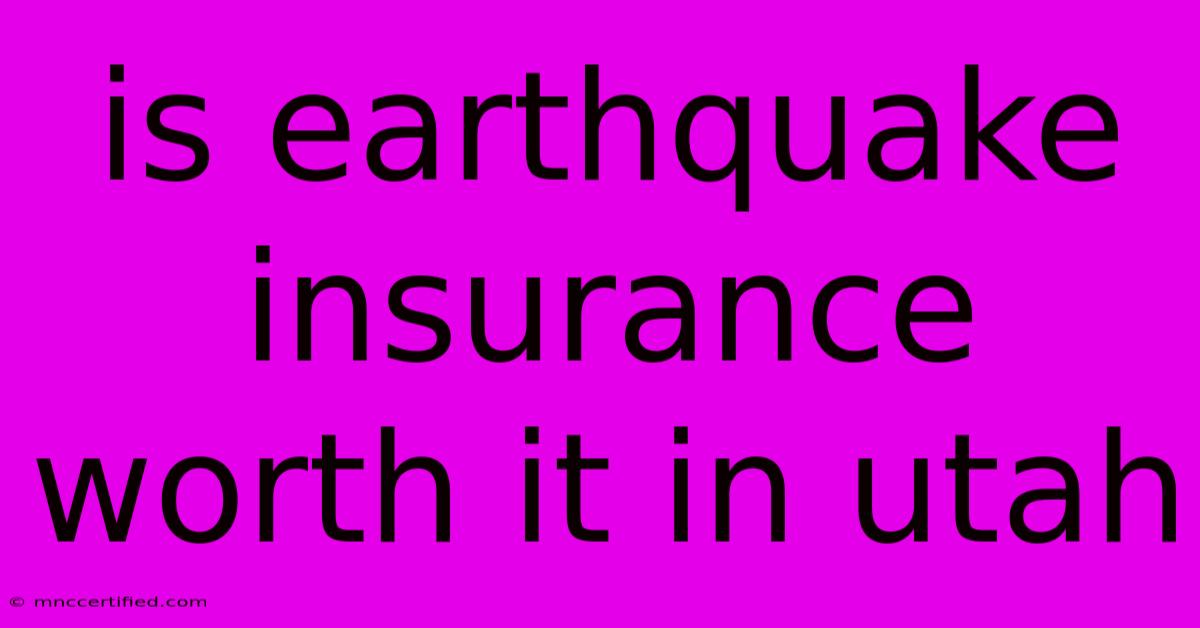Is Earthquake Insurance Worth It In Utah

Table of Contents
Is Earthquake Insurance Worth It in Utah? A Comprehensive Guide
Utah is a state renowned for its stunning natural beauty, but this beauty comes with a certain level of geological risk. The Wasatch Fault, running along the Wasatch Front, makes Utah susceptible to earthquakes. This raises a crucial question for homeowners: is earthquake insurance worth it?
While the answer isn't one-size-fits-all, this article provides a comprehensive analysis, helping you make an informed decision about earthquake insurance in Utah.
Understanding Utah's Seismic Risk
The Wasatch Fault is a major seismic hazard, capable of producing earthquakes with magnitudes exceeding 7.0. The Salt Lake Valley, home to a significant population, sits directly on this fault line.
Key factors influencing Utah's earthquake risk:
- Fault Line Proximity: The Wasatch Front experiences frequent seismic activity due to the proximity of the Wasatch Fault.
- Soil Conditions: Certain soil types amplify earthquake waves, leading to greater damage in specific areas.
- Building Codes: Older structures built before updated seismic codes are more vulnerable to earthquake damage.
The Benefits of Earthquake Insurance
Earthquake insurance provides financial protection in the event of an earthquake, covering:
- Building Damage: Repairs or reconstruction of your home's structure.
- Personal Property: Replacement costs for damaged or destroyed belongings.
- Additional Living Expenses: Temporary housing and other costs associated with displacement.
Crucial Considerations:
- Deductibles: Earthquake insurance policies have high deductibles, often 10% or more of the home's value.
- Coverage Limits: Policies typically have coverage limits, impacting the extent of financial protection.
The Cost of Earthquake Insurance in Utah
The cost of earthquake insurance in Utah varies based on:
- Home Value: Higher-value homes generally have higher premiums.
- Location: Areas closer to the Wasatch Fault face higher premiums due to increased risk.
- Building Construction: Newer, earthquake-resistant homes often have lower premiums.
Key Considerations:
- Financial Impact: Assess the cost of earthquake insurance against your overall budget and financial situation.
- Insurance Options: Compare policies from different providers to find the best coverage and pricing.
Weighing the Risks and Benefits
Factors to Consider:
- Your Home's Value: If your home is a significant asset, protecting it financially through earthquake insurance might be essential.
- Your Financial Situation: Can you afford the potential costs of earthquake damage without insurance?
- Your Risk Tolerance: Are you comfortable with the potential financial risks associated with an earthquake?
Ultimately, the decision to purchase earthquake insurance in Utah is a personal one. By understanding the risks, benefits, and costs involved, you can make an informed choice that aligns with your individual circumstances.
Taking Action to Protect Your Home
Whether or not you choose earthquake insurance, consider these steps to minimize earthquake risks:
- Seismic Retrofitting: Upgrade older homes with earthquake-resistant features like bracing and foundation reinforcement.
- Secure Appliances: Anchor heavy appliances and furniture to prevent them from falling during an earthquake.
- Emergency Preparedness: Develop an earthquake preparedness plan, including evacuation routes and emergency supplies.
By taking these proactive steps, you can further reduce your vulnerability to earthquake damage and enhance the safety of your home and family.
Conclusion
The decision of whether or not to purchase earthquake insurance in Utah is a complex one. By carefully evaluating your individual circumstances, understanding the risks and benefits, and taking proactive steps to protect your home, you can make an informed choice that provides peace of mind and financial security in the face of potential seismic events.

Thank you for visiting our website wich cover about Is Earthquake Insurance Worth It In Utah. We hope the information provided has been useful to you. Feel free to contact us if you have any questions or need further assistance. See you next time and dont miss to bookmark.
Featured Posts
-
Halle Baileys Relationship Drama With Ddg
Nov 08, 2024
-
Renovation Loans For Investment Property
Nov 08, 2024
-
Fidelity Investments Westlake Tx Address
Nov 08, 2024
-
Do Insurance Companies Cover Metal Roofs
Nov 08, 2024
-
Does Renters Insurance Cover Trampolines
Nov 08, 2024